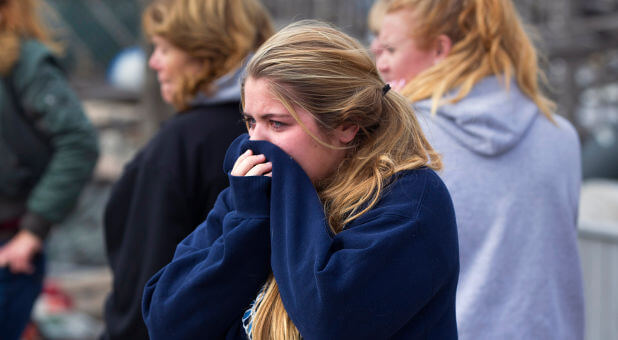Where was God when Superstorm Sandy pounded the Eastern Seaboard, killing at least 50 and causing historic destruction? And where was God in 2011 when the tsunami and earthquake claimed more than 200,000 lives in Japan?
In the wake of such incredible loss and disaster, we struggle to understand how a God who is all-powerful and all-knowing can also be considered good and loving. Pastor and teacher Erwin Lutzer tackles this tough subject head-on in his book, Where Was God?
“The question of natural disasters is very important,” said Lutzer in a phone interview last year. “The Bible even records stories of natural disasters.” During our discussion, Lutzer answered a number of questions that are detailed in his book.
Q: Can you address something we hear many times, which is “Why would God allow natural disasters?”
Lutzer: One thing we have to remember is that the world is fallen. The Bible says that when man fell into sin, all of nature was cursed. In other words, it was impossible for a sinful man to live in a perfect environment of paradise, so all of nature is cursed.
But having said that, it doesn’t mean that God has a hands-off policy when it comes to natural disasters. Many people want to protect God from the clear teaching of the Bible, which shows He is involved in natural disasters. It is not that God causes them, but the very fact that He could prevent them shows that we need to face squarely the fact that natural disasters happen within God’s providence.
Let me give you a few examples. During the time of the plagues in Egypt, clearly God sent those plagues. Then you have the time of Noah; the flood obviously was sent by God. It says regarding Jonah, God hurled a storm into the sea. We must see God in natural disasters. The question, of course, is why does he allow them and what is there to be learned.
Q: What kinds of lessons can we learn from natural disasters?
Lutzer: Natural disasters are a megaphone from God and they teach us various lessons. First of all, natural disasters show us the uncertainty of life. Thousands of people wake up in the morning not knowing what is going to happen that day, such as the terrible devastation in Haiti and elsewhere. There was a couple that left California because they were afraid of earthquakes. Then when they came to Missouri, they were killed in a tornado. We can’t get away from the reality that life is very, very short and it’s possible for us to delude ourselves.
When we look at the news and see these disasters, it’s like a preview of the natural disasters that will someday come upon the earth. When you look at the second coming of Christ, you find many different natural disasters connected with it.
Q: What can Christians say to neighbors and friends who question whether God can be merciful and loving and allow disasters to happen?
Lutzer: One of the greatest challenges we have as Christians is to somehow continue to believe God and to trust Him in the midst of horrendous devastation. When you see children being separated from their fathers and mothers, when you see lives being torn and hundreds of people dead, it is very natural to ask the question, “Where is God?”
What we need to realize is that God can be trusted, even when it seems as if He is not on our side. We have to point people to the fact that God has intervened in our planet by sending Jesus Christ. There we see the love of God most clearly.
It was Martin Luther who said, “When you look around and wonder whether God cares, you must always hurry to the cross and you must see Him there.”
The other thing you need to realize is that time is short and eternity is long. Sometimes we reverse that. The values that we have here on this earth, although life is precious, the fact is that earthquakes do not increase death. Everybody is going to die someday. It’s the way they die that causes us so much grief.
When we hear about a natural disaster we should grieve with those who grieve. And we should ask what we can do to alleviate their suffering.
Finally, I think this is the best illustration. All of Job’s 10 children died in a natural disaster. There was a wind storm that blew down the house. Job was confronted with the fact that because of a natural disaster, there are 10 fresh graves on the hilltop. So now what is he going to do?
His wife says to curse God and die. But Job said, “The Lord gave and the Lord has taken away. Blessed be the name of the Lord.” Job shows us it is possible to worship God even without explanations, even when we don’t know all the reasons. Those who worship God under those conditions are especially blessed.
Click here for original article on BillyGraham.org.












































